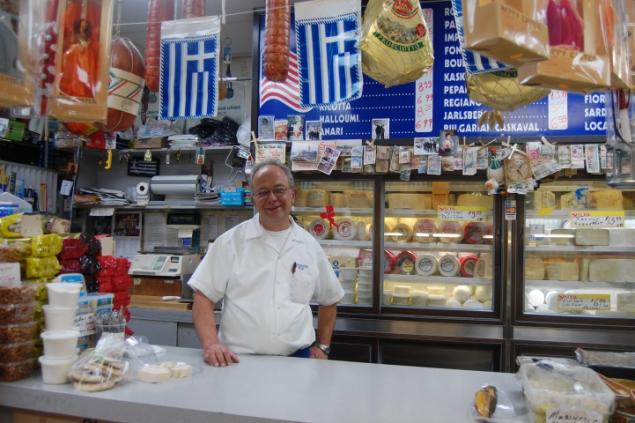Economic turmoil in the Mediterranean country is spurring a third wave of immigration to the bustling Greek enclave in Queens
By Kristina Bogos / NEW YORK DAILY NEWS
*photo: Dimitris Pinos has been the manager of Mediterranean Foods, a Greek supermarket in Astoria, Queens, for 33 years. In recent months, about ten Greek immigrants come into the store every day asking for job applications, Pinos said.
Astoria is once again living up to its reputation as a home away from home for Greeks as it embraces a new influx of immigrants fleeing economic turmoil in the Mediterranean country.
But the new emigres also face an uncertain future in the United States as they try to navigate complex immigration rules.
Danae Vasiliadou immigrated to Queens from Thessaloniki just three months ago. While she struggled to find a job, she found solace within Astoria’s Greek community.
“It doesn’t really feel like I moved to the States. It’s like I moved to a village in Greece,” said Vasiliadou, 25. “Everybody is Greek, the places are Greek.”
With the economic crisis deepening, about 5,000 Greeks fled their homeland for Astoria in the past year, compared to about 2,000 a year in the previous half decade, according to Nicholas Alexiou, professor of sociology at Queens College. Alexiou has studied Greek immigration to Astoria for over twenty years.
Many are under the Visa Waiver Program and come to test the waters with a temporary three-month long visa, while others arrive with tourist or student visas.
“Now, it’s mainly professionals. Either they are doctors, teachers, people who have some kind of degree already in Greece,” Alexiou said. “Here [immigrants] are willing to take any job to support their family and themselves.”
Others, like George Hatzopoulos, 22, from the suburbs of Athens, moved to Astoria three years ago to live with his grandparents and attend college in the U.S. He is a part-time student at Queensborough Community College, juggles two jobs and interns at a music studio in Long Island City.
“I’ve been doing things I could never possibly think to do in Greece,” Hatzopoulos said recently while on break at his job at Oveila restaurant on 30th Ave. “I can afford to have an apartment, I can afford to have a car, I can afford to pay tuition.”
Hatzopoulos, a U.S. citizen who moved to Greece at the age of 5, was no stranger to financially instability while he was there. For the past three years he has been sending money back home to his immediate family.









